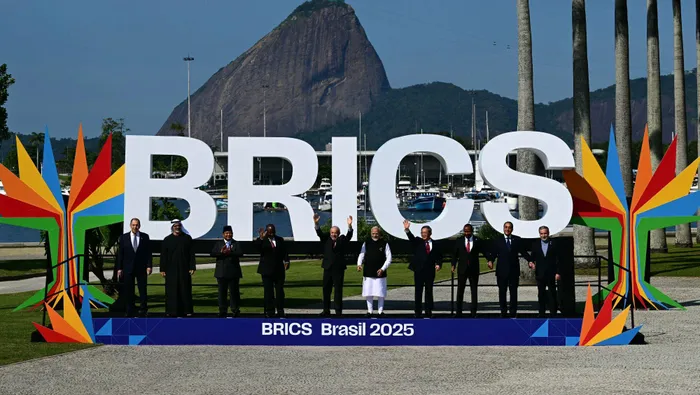
Trump last week announced that he was planning to slap a 10% tariff on imports from the BRICS economic group of emerging-market nations, including Brazil, Russia, India and China. The expanded BRICS+ now covers 43% of the world's population, 32% of the world’s land area, around 35% of global GDP and 20% of world exports.
Image: Pablo Porciuncula / AFP
Investors in South Africa have cautioned that the US President Donald Trump was using tariffs on BRICS countries as a red herring to stifle the perceived dominance of China over the United States.
Trump last week announced that he was planning to slap a 10% tariff on imports from the BRICS economic group of emerging-market nations, including Brazil, Russia, India and China, along with a 50% duty on all copper imports and a possible 200% tax on pharmaceuticals.
The expanded BRICS+ now covers 43% of the world's population, 32% of the world’s land area, around 35% of global GDP and 20% of world exports.
Trump explained the BRICS tariff threat was being driven by a desire to protect the US dollar from potential threats to its dominance as the BRICS bloc looks to unseat the greenback as the world’s reserve currency.
Commentators indicate that the dynamics of global power shifts are increasingly influenced by economic alliances, and Trump's scepticism about BRICS appears to stem from a fear that any concerted effort to empower China could ultimately threaten the United States' position at the pinnacle of global affairs.
The sentiment is that Trump perceives the BRICS coalition not merely as a trade agreement but as a strategic challenge to the supremacy of the US dollar.
Deon Gouws, chief investment officer at wealth management firm Credo, said Friday he did not think that Trump cared much about BRICS, but he does care a lot about China.
Gouws said Trump’s focus is squarely on China as the only nation that poses a substantial challenge to the United States’ longstanding supremacy with its impressive economic growth and innovative prowess.
“For perspective, the GDP of the five founding members of BRICS members combined approximates that of the USA; having said that, China represents more than two thirds of that number on its own,” Gouws said.
“In a nutshell, therefore, Trump is pretty scared of China, for good reason (large economy, productive workforce, strong growth, lots of adaptability and innovation) and therefore he also takes a dim view of any country that might be seen to be assisting China in growing even powerful.”
In the broader context, this sentiment reflects a growing unease in Western political circles—one that transcends individual leaders and speaks to an emerging narrative about the future balance of power.
Luncedo Mtwentwe, managing director of Vantage Advisory, concurred with this sentiment, saying that Trump believes that the BRICS bloc was set up to undermine the US dollar so that it no longer serves as the world’s standard currency, hence he wants to destabilise it.
Mtwentwe said Trump sees the US was at risk of losing its position as the global trade standard if the dollar was weakened as other countries would then be able to trade on their own without using the greenback.
“With China and Russia being part of that, countries he doesn’t favour, he knows that the moment you remove the dollar as the standard, the Chinese can take over. That’s one of the key reasons he’s opposed to BRICS. Therefore, we must expect more additional tariffs that might be coming into BRICS countries,” Mtwentwe said.
“So the question is, will countries take the risk and accept trade losses in the name of fighting the US? I don’t think most of these countries are willing to take that risk. The impact would be too severe.
“If they retaliate in the short term, things like inflation and unemployment can skyrocket in these countries, due to the fact that they are fighting the world’s number one economy in terms of trade. But in the long term, if they take the risk, I’m sure these countries can reap the rewards.”
Mtwentwe said BRICS nations have to unite more and forge intentional trade relations that will make these countries more competitive.
“It's time to focus on building strong local supply chains, increasing trade through AfCFTA, and establishing South Africa as a manufacturing and innovation hub for the entire continent. And let's not forget the BRICS nations who offer a massive opportunity for us to establish more competitive trade deals and diversify our reach,” he said.
